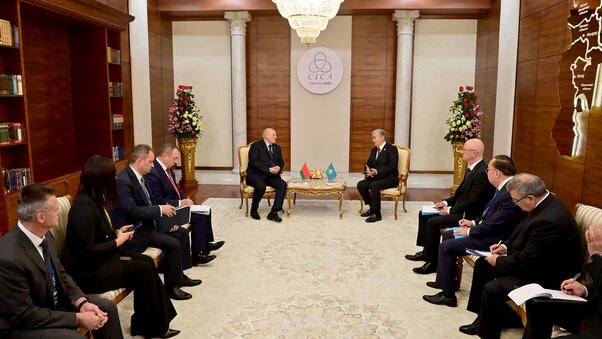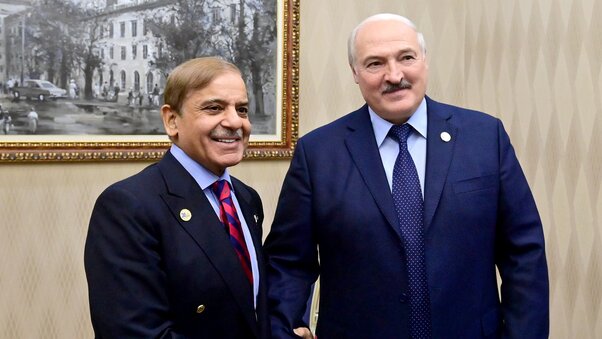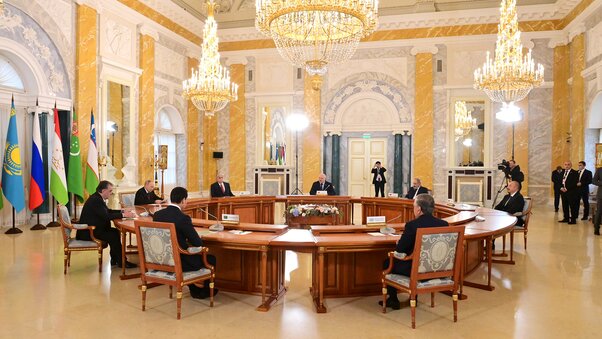CIS summit in Astana
- 20
- 3
Belarusian President Aleksandr Lukashenko attended the meeting of the CIS Council of Heads of State in Astana on 14 October.
Kazakhstan President Kassym-Jomart Tokayev welcomed the participants of the meeting in his opening speech.
Kazakhstan presides in the CIS this year. “Today, the CIS Council of Heads of State will consider important issues relating to humanitarian partnership, security and other areas of our cooperation,” the President of Kazakhstan said. Chairman of the CIS Executive Committee Sergei Lebedev took the floor to inform the participants about the draft agenda and the rules of work.
After that the leaders of the CIS countries continued the meeting in a narrow format behind closed doors.
“Unfortunately, what we had been talking about for so long, for so many years has materialized, it has become a reality. A real hybrid war has been unleashed against all of us. And Ukraine is just a pretext. Western countries have long been mulling over revenge for the campaigns they lost in the previous century, starting from the first days after the victory in the Great Patriotic War, and maybe even earlier,” the Belarusian leader said.
According to him, Russia and Belarus have found themselves in the crosshairs of economic and financial attacks. “However, I think that everyone here understands that the true objectives of Western strategists are much bigger - to divide the Eurasian space into sectors of influence and use our countries as raw material and industrial colonies. We need to be prepared for all kinds of provocations around the entire perimeter of the CIS. The recent events in Kazakhstan and Uzbekistan are striking and very illustrative examples. But this is just the beginning. Everyone will be put to the test,” Aleksandr Lukashenko emphasized.
“Unfortunately, I have to acknowledge the absence of mutual support in a number of cases,” the head of state noted. He drew attention to the fact that principled positions of some countries still hinder effective joint response to the Western sanctions.
Aleksandr Lukashenko also noted that many interethnic and territorial disputes remain unresolved in the post-Soviet space. This matter was also discussed at the summit. “These are the disputes that the Soviet Union could not or did not have time to resolve. Today, external players are making incredible efforts to turn every, even the most insignificant, dispute into a heated confrontation,” the President said.
“The economic situation is complicated. Ill-conceived actions of individual governments, primarily in the West, have caused significant damage to the global economy. By the example of Belarus and Russia, you have seen how fast traditional sales markets can close for our products and critical imports become unavailable, how fast the established forms of interstate settlements, investment, and much more can become unaccessible,” the Belarusian leader said.
“Yet, we have everything in place to minimize the impact of global upheavals and unfriendly moves of aggressively minded states. We just need to skillfully use these opportunities,” Aleksandr Lukashenko emphasized.
That meeting was followed by an extended-format session.
In accordance with the rotation, in 2023 the chairmanship in the CIS goes over to Kyrgyzstan. The heads of state also decided that the next meeting of the CIS summit will be held in Bishkek on 13 October 2023.
The CIS leaders also agreed with the proposal of Kazakhstan President Kassym-Jomart Tokayev to rename the position held by Sergei Lebedev from Chairman of the CIS Executive Committee – CIS Executive Secretary to CIS Secretary General from 2023.
After the summit Aleksandr Lukashenko talked to mass media representatives.
The head of state said that counterterrorism measures had been implemented in Belarus due to an aggravation of the situation along the country’s borders.
A Russian reporter asked the President why Belarus had introduced such a state. Aleksandr Lukashenko said: “It has been introduced due to the aggravation of the situation along the perimeter of our borders. In line with the documents the Union State of Belarus and Russia has for such cases. It was stipulated a long time ago: we will declare the state of heightened terrorist threat due to aggravation. This is why we started the procedures by deploying the Union State force grouping. I’ve already said that the Belarusian army is at its core and it is supplemented by units of the Russian Federation. Everything according to plan.”
Aleksandr Lukashenko was asked by Russian journalists to comment on Ukraine’s official statement that Ukraine is already de facto a NATO member.
“We don’t really care. It is more of wishful thinking. Actually this doesn’t bother us very much. If they want to be a NATO member, well, God bless them. With all the ensuing consequences, of course,” the President said.
When asked whether he is afraid of escalation, Aleksandr Lukashenko said: "I am. I don't want any escalation. President Putin and I have just had a brief discussion about this. No one wants that. Neither Belarus nor Russia. Human lives are precious to us. But you understand that it does not depend on us. Once the West, some countries of the West and you know which ones, decide against escalation, there will be none. We're not pushing for escalation, we're just defending ourselves."
Aleksandr Lukashenko recalled the statements made by the Polish authorities about the need to deploy nuclear weapons on their territory. They have even conducted a sociological survey on this topic. "They claim that more than 50% of Poles are in favor of their country hosting nuclear weapons, USA bringing them there. I don't think most Poles hold this view. It is their leadership that are escalating the situation. Now they claim that Polish people support this idea," the President said.
“Of course, it bothers us,” Aleksandr Lukashenko said. The head of state added that Belarus has been taking counter-terrorism measures in response to the emerging situation, and began deploying the regional group of forces in the western direction together with Russia.
The President was asked how strong this group of forces will be. “You know our army is about 70,000 people. This is the core. I think that today there is no need to demand 10,000-15,000 soldiers from Russia. It currently has enough issues to deal with. You know what I am referring to. So, we will proceed from this number. Our military are getting ready,” he replied.
The journalist recalled the words of the head of state that the main thing was to prevent Belarus from being drawn into hostilities. “Will you hold out? Will you be able to avoid it?” he asked.
“For sure. Even if we get dragged, we will be able to hold ground. We will keep this direction protected. They are already making statements (I don't want to name sources) ‘We will go straight.’ This is what Americans say at their gatherings in Warsaw. We see and hear it. It means they will go through Belarus, like some did in the past. It is very unlikely that they will succeed. We see it, hear it, and it troubles us. We are trying to not let this happen. This is our policy,” said the Belarusian leader.


